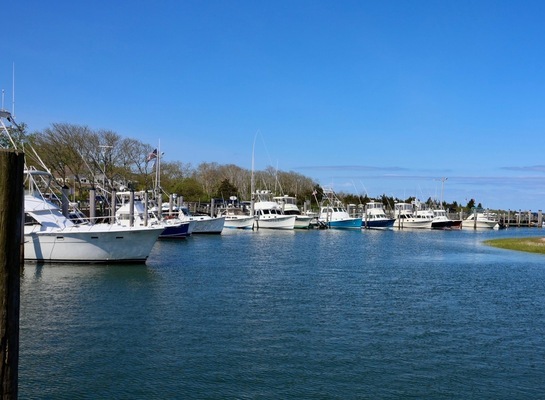Town Campus, Rock Harbor Bulkhead Lead Orleans Warrant
 Voters will be asked to borrow $9 million to fund improvements to Rock Harbor. FILE PHOTO
Voters will be asked to borrow $9 million to fund improvements to Rock Harbor. FILE PHOTO
ORLEANS – Voters will weigh in on a total of 54 articles at this year’s annual town meeting, scheduled for May 13 at 6 p.m. in the gymnasium of Nauset Regional Middle School.
This year’s spring warrant includes two Proposition 2½ overrides. Article 17 seeks $9 million for improvements to the Rock Harbor bulkhead, while Article 18 asks for $1.2 million to prepare a final design for the third phase of town sewering in the areas of Crystal Lake, Pilgrim Lake, Lonnie’s Pond and Arey’s Pond.
Other articles on the spring slate include a request for $150,000 in support of a Massachusetts Board of Library Commissioners grant to help fund the construction of a new Snow Library; another $150,000 in free cash to fund a feasibility study looking at options for a town campus on Eldredge Park Way; $75,000 to fund an alum treatment at Crystal Lake; and adoption of the town’s proposed $51.2 million operating budget for fiscal 2025.
The articles are divided between 50 slated for the annual town meeting warrant and four packaged for a special town meeting warrant. Town Manager Kim Newman and Assistant Town Manager Mark Reil made an effort this year to pare down the number of articles this spring, which totaled 75 last year and 83 in 2022.
Fishing For Funds
A study found the Rock Harbor bulkhead to be failing as far back as 2017. The bulkhead and commercial wharf would be completely overhauled with approval of the article on May 13, followed by borrowing approval at the May 21 annual town election.
The new wharf would be set back 20 feet and allow for end-in boat docking, while a new floating dock system would also be created to make it safer and easier for commercial fishermen using the facility to climb on and off their vessels. Other aspects of the project include the creation of a public viewing area between the commercial wharf and the neighboring charter fleet, the re-stabilization of a nearby stone wall and the installation of a mechanical hoist system for offloading catch.
But the cost of the project has risen significantly in just the last few months. Harbormaster and Natural Resources Manager Nate Sears in February estimated the project to cost between $6 million and $7 million. But Reil told the select board April 10 that bids submitted for the work came in at just over $8.9 million. The town meeting measure seeks $9 million.
The town has the opportunity to apply for grants that collectively could reduce the project cost by as much as $3 million. Those include a $1 million through the Seaport Economic Council, as well as a $2 million grant from the state Office of Coastal Zone Management.
Phase 3 Sewering
The town’s proposed third phase of sewering would bring approximately 300 properties onto town sewer in the “lakes and ponds sewer study area.” It follows earlier phases downtown, where property owners have received their notices to connect to sewer, and in the area of Meetinghouse Pond, where sewer construction is currently in process.
The warrant also includes an article seeking authorization to expand the Meetinghouse Pond sewer area at no additional cost to the town. Article 19 seeks to tie an additional 28 properties into town sewer using previously appropriated funds for the phase two work that have yet to be spent.
One Borrow, One Build
As town officials continue to wrestle with a number of needed capital projects and limited land on which to site them, Newman has advocated in recent months for the potential creation of a town campus to house some of the town’s future building needs.
The $150,000 sought through Article 32 would fund a feasibility study to look at options for development at 46 and 58 Eldredge Park Way, the respective addresses of Orleans Elementary School and the Orleans Fire Department.
Campus talk has centered primarily upon construction of a new fire station and elementary school. The fire station opened its doors in 1987 and no longer meets the needs of a modern fire facility. Meanwhile, the Orleans Elementary School committee is exploring either a renovation of the existing school, the earliest portion of which dates to 1956, or construction of a new building. A new building could also accommodate additional space for other town programming needs.
“We have a number of competing priorities,” Newman told attendees of a discussion on future capital planning hosted by the Orleans Citizens Forum in January. “Is there a possibility here in which we can consolidate into one project in order to do one build, one borrow, one timeline, one location, and save the town a lot of money?”
During a joint meeting in March, the select board and the elementary school committee expressed a willingness to work collaboratively toward a campus concept. Newman said with approval to fund the study, the town could come back to voters at the annual town meeting in 2025 with options for a campus to consider.
New Year, New Operating Budget
The proposed $51,202,161 operating budget for fiscal 2025 represents a 10.5 percent increase from the current fiscal year.
The increase in the town’s share of the coming year’s Nauset Regional School District assessment is one of the budget’s biggest cost drivers. Orleans’ share for FY 2025 is $6,571,582, an increase of approximately 9 percent from FY 2024. Nauset officials said cost increases beyond their control, including transportation and employee health insurance, are driving the regional school district’s operating budget up this year.
The town’s debt service is also up noticeably from the current fiscal year. The $9,935,309 figure includes the town’s share of debt related to the ongoing Nauset Regional High School construction project.
Funding Sought In Support Of Library Grant
As efforts to design and build a new Snow Library continue to advance, the Snow Library board of trustees and the Snow Library feasibility task force are hoping to secure a grant from the Massachusetts board of library commissioners to help cover some of the cost of the project’s construction.
Article 31 on the spring warrant seeks $150,000 in town funds that would help library proponents secure the grant. The funding would demonstrate the town’s commitment to a new library, and that show of support is required as a condition of successfully applying for the state funding.
The current library was built in 1952 and was renovated in 1977 and again in 1992. But as modern libraries continue to evolve into multi-faceted community buildings with more diverse programming, a larger library with more space is needed, proponents say.
The task force, with the assistance of Oudens Ello Architecture of Boston, have prepared three preliminary designs for a new library at the site of the existing building at 167 Main St. The designs call for a modern building with increased programming space as well as additional room for community programming.
Alum Treatment For Crystal Lake
Article 29 requests $75,000 for an alum treatment to help improve the water quality in Crystal Lake, which was forced to close to swimming temporarily in October due to an algal bloom.
In January, abutters of and proponents for the lake went before the select board requesting the treatment, which uses aluminum sulfate to bind with phosphorus in the water to help prevent future algal blooms.
“An alum treatment is the most pragmatic, cost effective tool available for immediate impact to improve Crystal Lake’s water quality,” Craig Boyce, a member of the Friends of Crystal Lake, told the board.
The treatment was called for as part of a management plan for the lake that was issued in 2021.
“The 2021 plan recommended completing an alum treatment in the lake as an interim step with a plan to sewer upgradient properties,” a summary of the article reads.
Town officials say with approval of the article, the treatment could be done in time for Memorial Day.
Regionalization And Efficiency Study
The special town meeting warrant includes a request for $50,000 in free cash to cover the town’s share of a study to explore efficiencies within the elementary schools in the Nauset district’s four member towns.
According to a summary of Article 2 on the special warrant, the funding would be used “to gather and analyze data for the elementary schools in all four towns regarding operating expenses, staffing levels, student-to-teacher ratios, enrollment trends, facility utilization, physical building conditions, anticipated capital expenditures, and student transportation systems to identify potential efficiencies across the schools.”
The towns of Orleans, Brewster, Wellfleet and Eastham collectively applied for a state grant through the state Department of Labor Services earlier this year to fund the study. But it was announced earlier this month that the towns were not awarded the funding.
Now the towns are individually seeking to secure funding for the study on their own, Newman told the select board April 10. Brewster is seeking $100,000 through its upcoming spring town meeting, while Eastham and Wellfleet are each also seeking $25,000 to cover their portions of the study funding.
“Everyone is mirroring the same language,” Newman told the select board. “The intention is still the same. We’ve all used the same materials from before, we’re just changing the funding source.”
Also On The Warrant…
The town’s bikeways and transportation advisory committee is putting forward Article 33, which asks for $85,000 for a feasibility study looking at options for a multi-use path extending from Beach Road and Main Street to Nauset Beach. With the funding, four designs would be prepared for future consideration.
“The concepts will consider right-of-way requirements, stone walls and trees, utility pole relocation, and existing infrastructure (culverts, driveways, etc),” according to the article summary.
Article 42 seeks voter approval to petition the state legislature to express its support for the state’s Affordable Homes Act, specifically a component that would allow the town to opt into a real estate transfer fee. Revenue from the fee would go to support the creation of more housing in town.
The town would also express its support of a “seasonal communities designation” through passage of the article. The designation would create a local property tax exemption for the development of year-round rental units in town.
Articles 43 through 48 on the annual town meeting warrant seek zoning bylaw amendments, many of which are designed to help make it easier for additional housing to be created in town. Those include an article that would allow new apartment projects to house between three and six new units by right, one that would make it easier for property owners to create accessory dwelling units, and another that would allow up to four residential units in a commercial building by right with conditions.
Email Ryan Bray at ryan@capecodchronicle.com
Please support The Cape Cod Chronicle by subscribing today!
You may also like:





